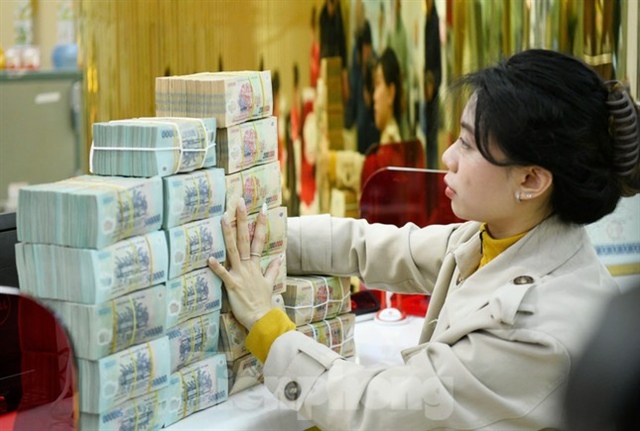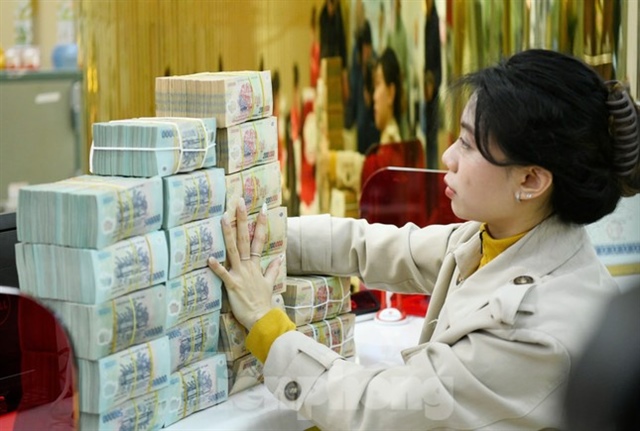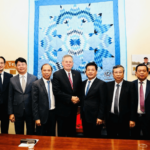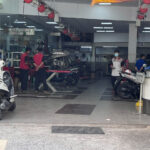“**22 out of 28 Banks Report an Increase in Non-Performing Loans**
*Agribank* has recently announced the auction of multiple companies’ debts. Specifically, Hoang Kim Construction Ceramics Trading and Transportation Joint Stock Company, TTT Vietnam Development Investment Limited Company, and Tu Liem Trading and Services Limited Company at Agribank Ha Thanh Branch have a combined debt of over VND 300 billion as of March 31, 2025, including more than VND 226 billion in principal debt and over VND 77 billion in interest.
Hung Anh Co., Ltd. – Hanoi Branch, Dai Minh Construction – Trading – Services Joint Stock Company – Hanoi Branch, Nhuận Hiển Construction and Transportation Limited Company, Tam Duong Infrastructure Investment and Development Joint Stock Company, and Hong Quan Construction Materials Trading Limited Company have a combined debt of over VND 416 billion as of March 31, 2025, including more than VND 308 billion in principal debt and over VND 107 billion in interest.
Hop Thinh Phat Vinh Phuc Joint Stock Company, Thai Duong Infrastructure Investment and Development Joint Stock Company, and Ha Tinh No. 6 Construction Materials Production Limited Company have a combined debt of nearly VND 333.8 billion as of March 31, 2025.
[ ](Many banks are struggling to handle non-performing loans.)
](Many banks are struggling to handle non-performing loans.)
The debt of QA International Trading and Investment Co., Ltd. and Thanh Cong Metal and Equipment Co., Ltd. amounted to over VND 257 billion as of March 20, 2025.
BIDV Thanh Do Branch has also announced the sale of Hang Ha Joint Stock Company’s debt, which totaled more than VND 730 billion as of October 31, 2024, including nearly VND 433.7 billion in principal and almost VND 296.4 billion in interest and penalty fees.
These bank debts are secured by real estate, factories, machinery, and other assets.
According to the first-quarter financial reports of banks, non-performing loans among listed banks continue to rise, totaling over VND 266,000 billion, an increase of 18.5% compared to the same period last year and over 16% compared to the end of 2024, equivalent to an increase of about VND 37,000 billion.
As many as 22 out of 28 banks reported an increase in non-performing loans compared to the previous year. The number of banks with a non-performing loan ratio above 3% increased to 8, while there were only 7 at the beginning of the year. All loan groups have increased. Substandard loans (Group 3) rose by over 37%, and doubtful loans (Group 5) increased by nearly 13%.
Mr. Nguyen Quoc Hung, Secretary-General of the Vietnam Bankers Association, stated that the total non-performing loans in the economy have exceeded VND 1,000 trillion. This massive “dead capital” is wasting resources in a capital-scarce economy and is a reason for the high lending interest rates. Additionally, collateralized assets associated with these loans cannot be utilized due to legal risks.
According to Mr. Hung, synchronizing the legal corridor for handling non-performing loans, including amending the Law on Credit Institutions and issuing a new circular on debt management and asset exploitation (AMC), will stimulate the development of the debt market. Currently, nearly 50% of non-performing loans are handled by risk provision. However, the most effective and sustainable solution, as evidenced by global practices, is to develop a debt trading market.
The expert suggested encouraging the establishment and expansion of debt trading companies, attracting foreign investors, and creating a legal corridor for the debt market. These solutions are highly anticipated, along with the legalization of Resolution 42.
**How to Address Non-Performing Loans?**
The State Bank of Vietnam has recently released a draft law amending and supplementing several articles of the Law on Credit Institutions to legalize regulations on handling non-performing loans, including seizing collateralized assets for banks.
The State Bank of Vietnam has also published a draft circular regulating the activities of credit institutions’ subsidiaries and associated companies in the field of AMC. According to the draft, the debt that AMC manages and exploits by authorization includes non-performing loans, both on and off-balance sheet. For AMC’s purchased debt, it only includes non-performing loans arising from lending activities, guarantee payments, and financial lease receivables, both on and off-balance sheet.
The State Bank of Vietnam stated that the activities of credit institutions are now more diverse than when Decision 1390/2002 was issued. Therefore, expanding the scope of debt acceptance, management, and handling by authorization of AMC is necessary to ensure sufficient resources to handle non-performing loans arising from the activities of credit institutions.
Worldwide, AMCs are established in various models to handle non-performing loans and restructure the assets of commercial banks. AMCs of commercial banks typically focus on managing internal non-performing loans or only purchase debts in special cases, such as when a company has a healthy loan but faces temporary financial difficulties. In such cases, the AMC may buy the debt and restructure it or sell it back when the company recovers, preventing it from becoming a non-performing loan.
“Specifying the scope of debts to be received, managed, and handled by authorization and purchase as non-performing loans is consistent with the primary objective of establishing a debt management company. This helps the debt management company focus on handling non-performing loans and prevents credit institutions from using the debt management company to buy and sell debts, altering their non-performing loan data and situation,” affirmed the State Bank of Vietnam.
Ngoc Mai
– 16:13 05/25/2025″
The Golf Market Swing: Vietnam’s Powerful Drive and Potential for Luxury Sportswear Investments
The Vietnamese golf industry is experiencing a promising growth spurt, attracting significant domestic and foreign investments. As a result, the luxury golf sportswear market has emerged as an enticing prospect, catering to the sophisticated tastes of the country’s elite and passionate golfers.
“Malaysian Businesses: Strengthen Your Bond with Vietnam, Says Prime Minister”
On the morning of May 25, during his working visit to Malaysia, Prime Minister Pham Minh Chinh attended the “Meet Vietnam – Malaysia Businesses” program, organized by the Ministry of Finance of Vietnam in collaboration with the Embassy of Vietnam in Malaysia and the Malaysia Chamber of Commerce and Industry.
Tightening Emissions Testing for Motorcycles
Motorcycles and scooters will need to meet Euro 2 emission standards to be allowed on the roads of Hanoi and Ho Chi Minh City from 2027 onwards.





















